- Home
- Cao Xueqin
The Warning Voice
The Warning Voice Read online
THE STORY OF THE STONE
VOLUME 3
ADVISORY EDITOR: BETTY RADICE
CAO XUEQIN (1715?–63) was born into a family which for three generations held the office of Commissioner of Imperial Textiles in Nanking, a family so wealthy that they were able to entertain the Emperor Kangxi four times. But calamity overtook them and their property was confiscated. Cao Xueqin was living in poverty near Peking when he wrote his famous novel The Story of the Stone, of which this is the third volume. The first two volumes, The Golden Days and The Crab-Flower Club, and the last two volumes, The Debt of Tears and The Dreamer Wakes, are also published in Penguin Classics.
DAVID HAWKES was Professor of Chinese at Oxford University from 1959 to 1971 and a Research Fellow of All Souls College, from 1973 to 1983. He now lives in retirement in Wales.
FOR JEAN
THE STORY OF THE STONE
A CHINESE NOVEL BY
CAO XUEQIN
IN FIVE VOLUMES
VOLUME 3
‘THE WARNING VOICE’
TRANSLATED BY
DAVID HAWKES
PENGUIN BOOKS
PENGUIN BOOKS
Published by the Penguin Group
Penguin Books Ltd, 80 Strand, London WC2R 0RL, England
Penguin Putnam Inc., 375 Hudson Street, New York, New York 10014, USA
Penguin Books Australia Ltd, 250 Camberwell Road, Camberwell, Victoria 3124, Australia
Penguin Books Canada Ltd, 10 Alcorn Avenue, Toronto, Ontario, Canada M4V 3B2
Penguin Books India (P) Ltd, 11 Community Centre, Panchsheel Park, New Delhi – 110 017, India
Penguin Books (NZ) Ltd, Cnr Rosedale and Airborne Roads, Albany, Auckland, New Zealand
Penguin Books (South Africa) (Pty) Ltd, 24 Sturdee Avenue, Rosebank 2196, South Africa
Penguin Books Ltd, Registered Offices: 80 Strand, London WC2R 0RL, England
www.penguin.com
This translation first published 1980
17
Copyright © David Hawkes, 1980
All rights reserved
Except in the United States of America, this book is sold subject
to the condition that it shall not, by way of trade or otherwise, be lent,
re-sold, hired out, or otherwise circulated without the publisher’s
prior consent in any form of binding or cover other than that in
which it is published and without a similar condition including this
condition being imposed on the subsequent purchaser
ISBN: 9781101490280
CONTENTS
NOTE ON SPELLING
PREFACE
CHAPTER 54
Lady Jia ridicules the clichés of romantic fiction; And Wang Xi-feng emulates the filial antics of Lao Lai-zi
CHAPTER 55
A foolish concubine seeks to humiliate her own daughter; And an ill-natured stewardess tries to outwit her young mistress
CHAPTER 56
Resourceful Tan-chun abolishes abuses in the interests of economy;
And sapient Bao-chai shows how small concessions can be made without loss of dignity
CHAPTER 57
Nightingale tests Jade Boy with a startling message; And Aunt Xue comforts Frowner with words of loving kindness
CHAPTER 58
In which the cock-bird who mourns his mate is found to be a hen;
And a true heart is able to sympathize with a strange kind of love
CHAPTER 59
By Willow Walk the conservers of property resort to violence and abuse;
And at Green Delights the defenders of law and order invoke a higher authority
CHAPTER 60
As a substitute for rose-orris Jia Huan is given jasmine face-powder;
And in return for rose essence Cook Liu is given lycoperdon snow
CHAPTER 61
Bao-yu owns up to a crime he did not commit;
And Patience bends authority in order that the innocent may be spared
CHAPTER 62
A tipsy Xiang-yun sleeps on a peony-petal pillow;
And a grateful Caltrop unfastens her pomegranate skirt
CHAPTER 63
Flower-maidens combine for nocturnal birthday revels;
And a grass widow copes with funeral arrangements single-handed.
CHAPTER 64
Five fair women make subjects for a chaste maid’s verse;
And nine jade dragons make a love-gift for a flirt
CHAPTER 65
Jia Lian’s second marriage is celebrated in secret;
And the future marriage of San-jie becomes a matter of speculation
CHAPTER 66
Shame drives a warm-hearted young woman to take her life;
And shock leads a cold-hearted young gentleman to renounce the world
CHAPTER 67
Frowner sees something that makes her homesick;
And Xi-feng hears something that rouses her suspicions
CHAPTER 68
Er-jie takes up residence in Prospect Garden;
And Xi-feng makes a disturbance in Ning-guo House
CHAPTER 69
A scheming woman kills with a borrowed knife;
And one who has ceased to hope swallows gold and dies
CHAPTER 70
Lin Dai-yu resuscitates the Poetry Club;
And Shi Xiang-yun tries her hand at a song lyric
CHAPTER 71
Lady Xing deliberately humiliates her daughter-in-law;
And Faithful inadvertently interrupts a pair of love-birds
CHAPTER 72
Wang Xi-feng refuses to see a doctor;
And Brightie’s wife seeks help with a betrothal
CHAPTER 73
A half-witted servant-girl picks up a highly embarrassing object;
And an easy-going young mistress refuses to inquire into a theft
CHAPTER 74
Lady Wang authorizes a raid on Prospect Garden;
And Jia Xi-chun breaks off relations with Ning-guo House
CHAPTER 75
Midnight revellers are startled by a sound of evil omen;
And Mid-Autumn moon-watchers listen to quatrains of unequal merit
CHAPTER 76
Flute-playing at Convex Pavilion provokes too much melancholy;
And linked verses at Concave Pavilion betray a morbid sensitivity
CHAPTER 77
A wronged maid takes a loving last leave of her master;
And three young actresses seek to escape matrimony in the cloister
CHAPTER 78
Jia Zheng commissions the Ballad of the Winsome Colonel;
And Bao-yu composes an Invocation to the Hibiscus Spirit
CHAPTER 79
Xue Pan finds to his sorrow that he is married to a termagant;
And Ying-chun’s parents betroth her to a Zhong-shan wolf
CHAPTER 80
Unfortunate Caltrop is battered by a philandering husband;
And One Plaster Wang prescribes for an insufferable wife
APPENDIX I Sandal, Musk and Skybright
APPENDIX II Suncloud, Sunset and Moonrise
APPENDIX III You San-jie, Liu Xiang-lian and Jia Lian’s Journeys
APPENDIX IV Old Mrs You and the Zhangs
APPENDIX V Fivey, Bao Er and The Mattress
APPENDIX VI Euergesia and the Little Actresses
CHARACTERS IN VOLUME 3
GENEALOGICAL TABLES
NOTE ON SPELLING
Chinese proper names in this book are spelled in accordance with a system invented by the Chinese and used internationally, which is known by its Chinese name of Pinyin. A full explanation of this system will be found overleaf, but for the benefit of readers who find systems of spell
ing and pronunciation tedious and hard to follow a short list is given below of those letters whose Pinyin values are quite different from the sounds they normally represent in English, together with their approximate English equivalents. Mastery of this short list should ensure that names, even if mispronounced, are no longer unpronounceable.
c = ts
q = ch
x = sh
z = dz
zh = j
CHINESE SYLLABLES
The syllables of Chinese are made up of one or more of the following elements:
1. an initial consonant (b.c.ch.d.f.g.h.j.k.l.m.n.p.q.r.s.sh.t.w.x.y.z.zh)
2. a semivowel (i or u)
3. an open vowel (a.e.i.o.u.ü), or
a closed vowel (an.ang.en.eng.in.ing.ong.un), or
a diphthong (ai.ao.ei.ou)
The combinations found are:
3 on its own (e.g. e, an, ai)
1 + 3 (e.g. ba, xing, hao)
1 + 2 + 3 (e.g. xue, qiang, biao)
INITIAL CONSONANTS
Apart from c = ts and z = dz and r, which is the Southern English r with a slight buzz added, the only initial consonants likely to give an English speaker much trouble are the two groups
j q x and zh ch sh
Both groups sound somewhat like English j ch sh; but whereas j q x are articulated much farther forward in the mouth than our j ch sh, the sounds zh ch sh are made in a ‘retroflexed’ position much farther back. This means that to our ears j sounds halfway between our j and dz, q halfway between our ch and ts, and x halfway between our sh and s; whilst zh ch sh sound somewhat as jr, chr shr would do if all three combinations and not only the last one were found in English.
SEMIVOWELS
The semivowel i ‘palatalizes’ the preceding consonant: i.e. it makes a y sound after it like the i in onion (e.g. Jia Lian)
The semivowel u ‘labializes’ the preceding consonant: i.e. it makes a w sound after it, like the u in assuages (e.g. Ning-guo)
VOWELS AND DIPHTHONGS
i. Open Vowels
a is a long ah like a in father (e.g. Jia)
e on its own or after any consonant other than y is like the sound in French auf or the er, ir, ur sound of Southern English (e.g. Gao E, Jia She)
e after y or a semivowel is like the e of egg (e.g. Qin Bang-ye, Xue Pan)
i after b.d.j.l.m.n.p.q.t.x.y is the long Italian i or English ee as in see (e.g. Nannie Li)
i after zh.ch.sh.z.c.s.r. is a strangled sound somewhere between the u of suppose and a vocalized r (e.g. Shi-yin)
i after semivowel u is pronounced like ay in sway (e.g. Li Gui)
o is the au of author (e.g. Duo)
u after semivowel i and all consonants except j.q.x.y is pronounced like Italian u or English oo in too (e.g. Bu Gu-xiu)
u after j.q.x.y and ü after 1 or n is the narrow French u or German ü, for which there is no English equivalent (e.g. Bao-yu, Nü-wa)
ii. Closed Vowels
an after semivowel u or any consonant other than y is like an in German Mann or un in Southern English fun (e.g. Yuan-chun, Shan Ping-ren)
an after y or semivowel i is like en in ben (e.g. Zhi-yan-zhai, Jia Lian)
ang whatever it follows, invariably has the long a of father (e.g. Jia Qiang)
en, eng the e in these combinations is always a short, neutral sound like a in ago or the first e in believe (e.g. Cousin Zhen, Xi-feng)
in, ing short i as in sin, sing (e.g. Shi-yin, Lady Xing)
ong the o is like the short oo of Southern English book (e.g. Jia Cong)
un the rule for the closed u is similar to the rule for the open one: after j.q.x.y it is the narrow French u of rue; after anything else it resembles the short oo of book (e.g. Jia Yun, Ying-chun)
iii. Diphthongs
ai like the sound in English lie, high, mine (e.g. Dai-yu)
ao like the sound in bow or bough (e.g. Bao-yu)
ei like the sound in day or mate (e.g. Bei-jing)
ou like the sound in old or bowl (e.g. Gou-er)
The syllable er is a sound on its own which does not fit into any of the above categories. It sounds somewhat like the word err pronounced with a strong English West Country accent, (e.g. Bao Er).
PREFACE
Before talking about the characteristics of a particular volume as I did in the Preface to Volume Two, I ought perhaps to have explained that the division of this novel into five volumes, of which each but the last ends with a request to the reader to ‘wait for the next volume’, is my own invention. Both the manuscript and early printed editions were divided into volumes, but they were volumes much shorter than these – ten chapters each or even fewer – ending not with a reference to the next volume but with the usual appeal to the reader to ‘read the following chapter’. However, although my division of the novel is as arbitrary as those earlier Chinese ones, the first three volumes as I divide it do seem to correspond with stages in its structural development, so that it is, I believe, meaningful to talk about the characteristics of a volume.
One characteristic of this third volume which will, I suspect, strike many readers is the important part that hitherto unknown or undeveloped minor characters are made to play in it. To the translator, on the other hand, its most striking characteristic is the intensification, to a point at which the novel almost breaks down beneath them, of those textual problems already mentioned in my prefaces to the two earlier volumes. These two characteristics of Volume Three – the development of minor characters and the growing number of contradictions in the text – have a causal connection which I shall presently try to explain.
As a preliminary I should like to examine three statements, each made by one of the people by whom the text was produced. The first is by the author himself.
Vanitas… subjected The Story of the Stone to a careful second reading. He could see that it consisted quite simply of a true record of real events, and that it was entirely free from any tendency to deprave or corrupt. He therefore copied it all out from beginning to end and took it with him to look for a publisher… Cao Xueqin in his Nostalgia Studio worked on it for ten years, in the course of which he rewrote it no less than five times, dividing it into chapters, composing chapter headings, renaming it The Twelve Beauties of Jinling and adding an introductory quatrain…
These words are found in a recension of the text dating from 1754, nine years before the author died. Although the statement is dressed in allegorical terms, there is no uncertainty at all about its meaning: years before he died Cao Xueqin completed his novel and subjected it to several revisions, and at least as early as 1754 he was engaged in producing what was to be its final version. Whether or not the ‘five times’ is to be taken literally does not now concern us – though the fact that this same passage lists five different titles which the novel is said at one time or another to have been given inclines me to think that it is: the most important thing to bear in mind is that there had been several already completed versions prior to the version he was then writing.
The second statement is by Cao Xueqin’s kinsman-collaborator Red Inkstone who produced the manuscript recensions of the novel from which most of the still extant manuscripts were copied. It appears in a comment dated September 1764.
Only one who understood the message of this book could have the hot and bitter tears with which to finish it. Xueqin, having run out of tears, departed this life on New Year’s Eve of the year ren-wu (12 February 1763) leaving this book unfinished. I have wept so much for Xueqin that I fear I too shall soon run out of tears…
Whatever ‘unfinished’ means in this second statement, it certainly does not mean that this is a novel like Edwin Drood or Weir of Hermiston which was never completed because its author was struck down in the midst of writing it. Apart from what Xueqin himself tells us in the first chapter, there is a marginal comment by Odd Tablet dated April 1762 (a few months before the author died) on the manuscript recension of 1760 telling us something about the contents of the fina
l chapter. This proves that there must have been one version at least which the author succeeded in finishing.
The third statement comes in the Prefatory Remarks to the revised edition of the novel printed only a few months after the first edition of 1792. The Prefatory Remarks were published under Gao E’s and Cheng Weiyuan’s joint signatures, but as it was Gao E who did the editing, it was probably he who wrote the Remarks. (In a short preface to the first edition Cheng Weiyuan had already explained how he spent many years combing the book markets for the missing forty chapters, and how he eventually handed over what he had managed to collect to his friend Gao E to edit.)
The text of the last forty chapters represents a patchwork of different fragments collected over the years. It is a unique text: we have no other text to collate it with. For this reason our editing has been confined to making a continuous narrative and removing the inconsistencies. We have not ventured to tamper with the text beyond those minimal requirements. Until some better text comes along which would justify a thoroughgoing revision, we are unwilling that any of its original features should be obscured.
What is one to make of these three apparently irreconcilable statements? Merely to say that one of the witnesses, viz. Gao E, must be lying leaves too many questions unanswered. Cao Xueqin and Red Inkstone still seem to be contradicting one another. Merely to insist that the last forty chapters of Gao E’s edition are spurious still does nothing to explain what happened to the genuine last forty chapters. I suggested in my Introduction to Volume One that the family may have suppressed them for political reasons, but I am not at all convinced that that is the correct explanation.
Let me return for a moment to the question of what Red Inkstone and Odd Tablet meant by ‘unfinished’. We know that in some cases it refers to small parts missing from otherwise completed chapters. Red Inkstone wrote a note in 1756 at the end of chapter 77 to remind himself that he was still waiting for Cao Xueqin to supply the Mid Autumn poems which were to be inserted in that chapter. He was still waiting for them when Xueqin died seven years later. But there are several mentions elsewhere of whole chapters missing. A note dated ‘summer of ding-hai’ (i.e. early autumn, 1767: four years after the author’s death) made by Odd Tablet on the 1760 recension of the first eighty chapters mentions a borrower losing ‘five or six chapters’ from the last third of the book ‘when we were making the fair copy’. The date of this loss is impossible to determine, but I should hazard a guess that it occurred not later than 1754 when Red Inkstone was making a fair copy of what was to be the ‘final’ version of the novel – the version in which the author refers to his ten years’ labour and many revisions of the text. Odd Tablet says that what was lost was the drafts of these chapters, i.e. Cao Xueqin’s own autograph of them, which had not yet been fair-copied.

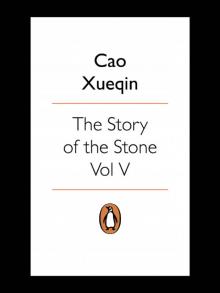 The Dreamer Wakes
The Dreamer Wakes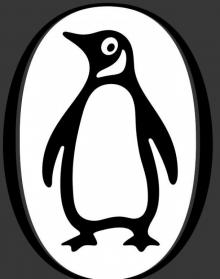 The Warning Voice
The Warning Voice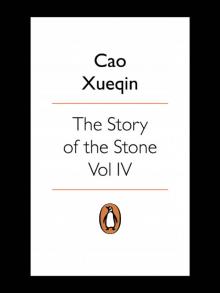 The Debt of Tears
The Debt of Tears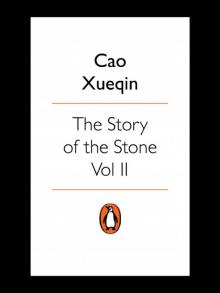 The Crab-Flower Club
The Crab-Flower Club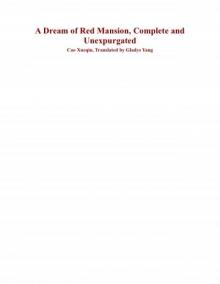 A Dream of Red Mansion
A Dream of Red Mansion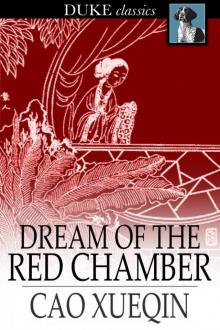 The Dream of the Red Chamber (Selection)
The Dream of the Red Chamber (Selection)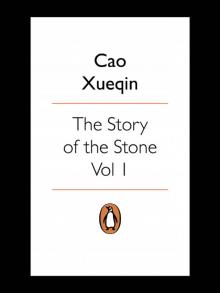 The Golden Days
The Golden Days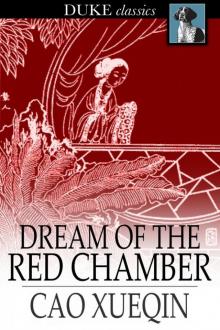 The Dream of the Red Chamber
The Dream of the Red Chamber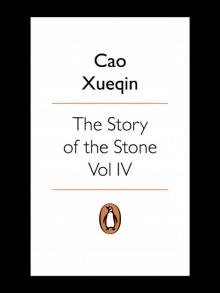 The Story of the Stone
The Story of the Stone